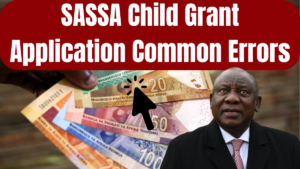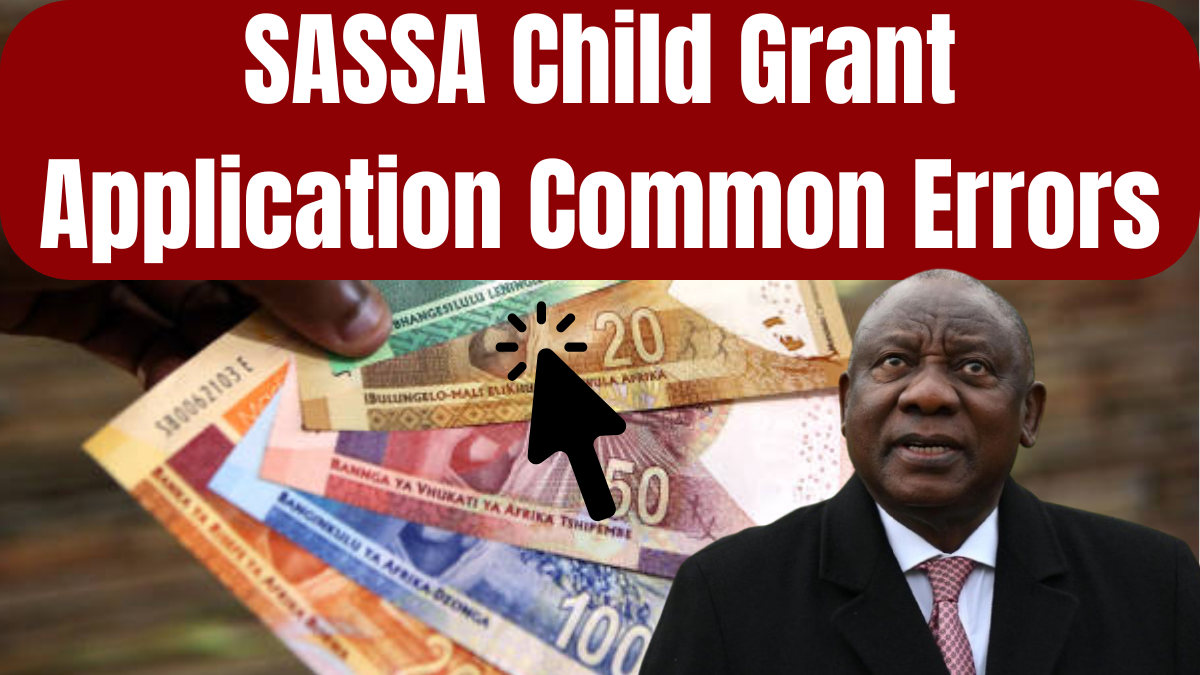The SASSA Child Support Grant (CSG) is a lifeline for over 13 million children in South Africa. It provides monthly financial aid to low-income families so that children under 18 can receive proper food, clothing, education, and healthcare. However, many eligible caregivers face delays or grant suspensions simply because of small but avoidable application errors.
Data from 2024 showed that more than 220,000 child grant applications were delayed or rejected due to missing documents, mismatched details, and other oversights. With the April 2025 cycle underway, it’s more important than ever to understand the process and avoid these mistakes.

Key Eligibility for the SASSA Child Grant
To qualify for the grant, a child must be under 18 years old and live in South Africa with a primary caregiver who meets the income requirements.
Here’s a quick look at the 2025 income limits:
- Single Applicant: Must earn less than R60,000 per year
- Married Couple: Combined income must be below R120,000 per year
Applications must be submitted in person at a SASSA office with all required documents. Grant funds are paid monthly via SASSA card, direct bank deposit, or retail store collection.
Mistake 1: Banking Details Don’t Match ID Records
A frequent cause of grant delays is mismatched banking information. If the name on the bank account doesn’t match the applicant’s ID exactly, the payment is blocked.
For example, using “T. Mokoena” instead of “Thandi Mokoena” can cause verification failure. Always ensure that your banking name matches your ID.
To fix this, visit your nearest SASSA branch with:
-
Your ID
-
A recent bank statement
-
A sworn affidavit (if needed) signed by a Commissioner of Oaths
Mistake 2: Not Collecting the Grant for Three Months
If a caregiver fails to collect the grant for three consecutive months, SASSA assumes the child no longer needs support or the caregiver is inactive, leading to automatic suspension.
Avoid this by collecting your grant every month. If you’re unable to collect due to illness or travel, submit proof such as a doctor’s note or affidavit to SASSA immediately.
Mistake 3: Failing to Report Important Life Changes
You must inform SASSA within 10 days if any of the following happens:
-
The child turns 18
-
The child moves out of the country
-
The child or caregiver passes away
-
The child enters a state institution
Failing to report these changes can cause suspension. In the event of a caregiver’s death, a new guardian must apply for the grant with updated legal documents.
Mistake 4: Submitting Incorrect or Incomplete Documents
Many rejections happen because of missing or incorrect documentation. Common issues include submitting photocopies instead of originals or omitting proof of legal guardianship.
Here’s a basic checklist for a complete application:
-
Your original South African ID
-
Child’s birth certificate or clinic card
-
Court documents or affidavits if you’re not the biological parent
-
Proof of income or maintenance (payslip or court order)
-
Marriage/divorce/death certificates (if applicable)
The form must be completed at a SASSA office in front of an official.
Mistake 5: Not Declaring All Income or Support Received
All caregivers must pass a means test, which means they must report their full income honestly. Many applicants forget to declare:
-
Informal or part-time job earnings
-
Child maintenance money
-
Partner or spousal income
SASSA accepts the following as proof:
- Formal income – Payslip or employer letter
- Informal work – Sworn affidavit
- Child maintenance – Bank statement or court order
- Spousal income – Proof of relationship and income
Being transparent reduces the risk of rejection and future audits.
How to Appeal a Rejected Child Grant
If your application is rejected, you can appeal within 90 days. The process includes:
-
Submitting a reconsideration request with corrected or missing documents
-
If denied again, escalating to the Independent Tribunal for Social Assistance Appeals
Make sure to include:
-
Your ID and the child’s birth certificate
-
All supporting financial documents
-
A copy of the rejection letter
Keep copies of all your submissions for follow-up.
Tips to Keep Your Child’s Grant Active
-
Always keep banking details updated and matching your ID
-
Don’t skip collecting payments for more than two months
-
Report any family changes immediately
-
Submit full and accurate documents
-
File appeals on time if needed
Need Help? Here’s How to Reach SASSA
-
Toll-Free Helpline: 0800 60 10 11
-
Website: www.sassa.gov.za
-
In-Person: Visit your nearest SASSA branch for assistance
Avoiding these small but common mistakes can save you weeks of frustration and ensure your child continues receiving support without interruption.
FAQs
What income qualifies me for the SASSA Child Support Grant in 2025?
Single applicants must earn below R60,000 per year, while couples must earn less than R120,000 combined to qualify.
What happens if I don’t collect the grant for three months?
Your grant will be automatically suspended. You must notify SASSA with proof if you’re unable to collect due to illness or travel.
Can I still apply without an ID?
Yes, but you must provide a sworn affidavit confirming your identity. Refugees can apply with their permit and 13-digit ID.
What documents are required to apply for the grant?
You’ll need your original ID, the child’s birth certificate, proof of income or maintenance, and legal documents if you’re not the biological parent.
How do I appeal a rejected application?
Submit a reconsideration request within 90 days. If it’s denied again, escalate to the Independent Tribunal with all supporting documents.
Click here to know more.
Aanchal is a passionate writer with a keen interest in storytelling, content creation, and creative expression. She enjoys exploring diverse topics and crafting engaging narratives that captivate readers.

